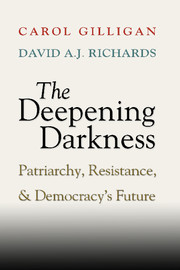Book contents
- Frontmatter
- Contents
- Acknowledgments
- Introduction and Overview
- Part One Roman Patriarchy: Entering the Darkness
- 1 Why Rome? Why Now?
- 2 Roman Patriarchy and Violence
- 3 Vergil on the Darkness Visible
- 4 Apuleius on Conversion
- 5 Augustine on Conversion
- Part Two Resistance Across Time and Culture
- Part Three Democracy's Future
- Conclusion
- Notes
- Bibliography
- Index
1 - Why Rome? Why Now?
Published online by Cambridge University Press: 01 September 2010
- Frontmatter
- Contents
- Acknowledgments
- Introduction and Overview
- Part One Roman Patriarchy: Entering the Darkness
- 1 Why Rome? Why Now?
- 2 Roman Patriarchy and Violence
- 3 Vergil on the Darkness Visible
- 4 Apuleius on Conversion
- 5 Augustine on Conversion
- Part Two Resistance Across Time and Culture
- Part Three Democracy's Future
- Conclusion
- Notes
- Bibliography
- Index
Summary
After the fall of the Soviet Union and the Berlin Wall, Fukuyama in a widely cited book claimed that history had come to an end, noting that the values of liberal constitutional democracy were widely embraced. This view now looks antique as we find ourselves, at home and abroad, confronted by violent forms of fundamentalism self-consciously at war with liberal norms and values. History never looked more appealing as a way to understand the challenges we face and why we face them. Among these challenges, which include economic inequality and global warming, two stand out as posing a puzzle that on the face of it strains credulity: the contentiousness over gay rights and abortion within U.S. politics and the focus on the state of Israel within international politics.
Starting from the normative position of political liberalism that requires respect for the basic liberties of conscience, speech, and association, we regard the right to an intimate, sexual life as a basic human right, now constitutionally protected in the United States and elsewhere. Yet in the United States, a reactionary coalition of religious fundamentalists has focused national elections on the sexually tinged issues of gay marriage and abortion. Why such fundamentalist rage at the constitutional recognition of basic rights and their reasonable elaboration?
Similarly, the state of Israel was founded as a consequence of European and American anti-Semitism. Why has anti-Semitism been such a lethal force in twentieth-century European politics?
- Type
- Chapter
- Information
- The Deepening DarknessPatriarchy, Resistance, and Democracy's Future, pp. 9 - 21Publisher: Cambridge University PressPrint publication year: 2008



